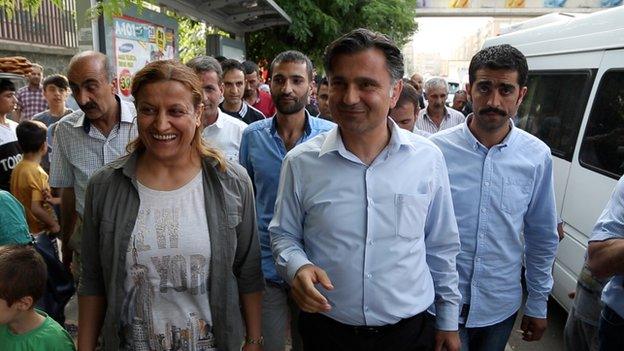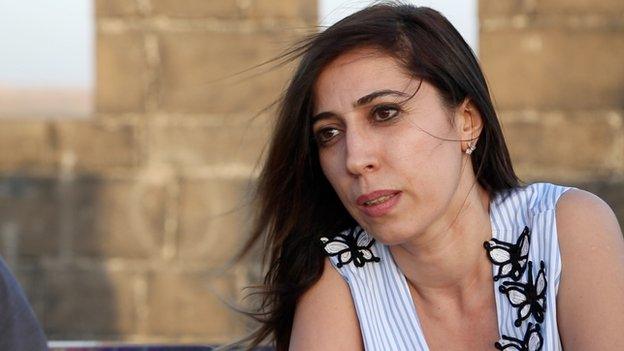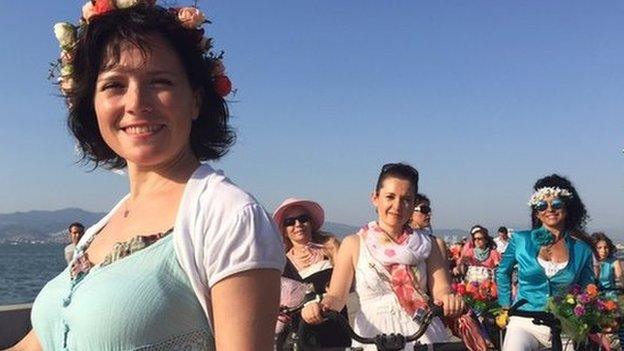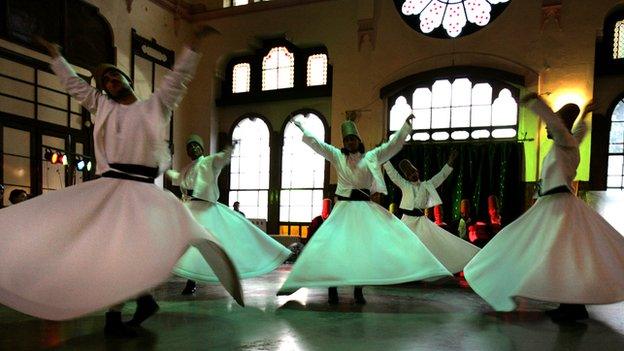Turkey election: Kurds, women, gays put faith in upstart party
- Published
The HDP party is "desperate to get into parliament to represent the Kurds on a national stage" reports the BBC's Mark Lowen
Once a week they gather, beneath the same tree in the same park - to remember.
For years it has been their ritual - women who lost children and husbands in 30 years of armed conflict between the Kurds and the Turkish state.
I meet them in Diyarbakir - the final stop of our election trip across Turkey.
Age and exhaustion are etched on their faces. One wears a necklace with a picture of her missing children. Another has a bracelet bearing the Kurdish flag.
"Turkey doesn't think we Kurds are humans", says Sakine Arat, 80, who lost four sons and one daughter in the fighting. "We've tried all the political parties but none sided with us. Now we've found one - the HDP - that treats us as equals. So we will vote for it."
The People's Democratic Party (HDP) is the one to watch in Turkey's election on Sunday.
Its roots and support base are Kurdish but it has broadened out, becoming a powerful voice of the Turkish left.
'Drown Erdogan'
Its candidates used to run as independents, winning a handful of seats. But this time, the HDP is a single, united party - and polls show it could cross the 10% threshold to get into parliament, potentially gaining dozens of MPs and depriving Turkey's governing AKP of a majority.
That would stop President Recep Tayyip Erdogan from changing the constitution to give himself more powers with an executive presidency - and is one reason why staunch Erdogan opponents are drawn to the HDP.
"Turkish soldiers burnt my home four times," says Dilsah Ozgen, 76, who lost her husband and two sons. "I believe in our HDP. We will pass the 10% and drown Erdogan in a flood of votes," she says.
There are around 15 million Kurds in Turkey - 20% of the population.
For decades they were repressed, their identity denied: "There is no such thing as Kurds; they are simply mountain Turks," was the official refrain.

Diyarbakir is the last stop on Mark's tour around Turkey ahead of the election. Follow the journey #bbcturkey15
In the 1980s, the Kurdistan Workers' Party (PKK) was formed, waging a three-decade insurgency against the Turkish state, some fighting for greater autonomy, others for independence.
Forty-thousand people died. The group is still labelled a terrorist organisation by Turkey, the US and EU.
Peace is fresh. Although conditions for Kurds have improved, the fragile ceasefire has been shaken by clashes as the peace process has stalled and the government has hardened its nationalist rhetoric.
Many Kurds who supported the AKP have now shifted allegiance to the HDP.
'Not Kurdish, but Turkish'
I join a local HDP candidate, Ziya Pir, at a Diyarbakir cultural centre.
Around him, supporters play traditional instruments and perform songs in both Kurdish and Turkish, appropriately enough for a candidate who is not actually Kurdish.

Election candidate Ziya Pir (second from right) says his HDP party reaches across traditional cultural divides
It epitomises the message of unity, of cultural crossover, that the HDP is trying to spread.
"I'm Turkish - from the Black Sea - and initially people asked me: 'Why are you joining a Kurdish party?'" says Mr Pir. "But I told them it is not a Kurdish party; it is Turkish. We want a Turkey in which all people can find themselves".
His uncle, Kemal, was a founder of the PKK. But he insists there is no link.
"I am not my uncle," he says. "The HDP has no relationship with the PKK. We want to make peace. I look into the eyes of people in Turkey and see no hope. I want to bring back hope."
There is a widespread feeling that if the HDP does not pass the 10% threshold, Kurdish anger will boil over - as many will believe the results are rigged.
"We need our representatives in parliament or I fear there will be a risk of going back to the 1990s - not a conflict between the PKK and the Turkish army, but between Kurdish people and the army," says Mr Pir.
The BBC's Selin Girit: "Turkey ranks nearly at the bottom of the world press freedom index"
Gender equality
The HDP's rise is partly down to its strong social democratic message, which also appeals to non-Kurds.
With two charismatic leaders, male and female, and many women candidates, it is promoting gender equality in a patriarchal society. It is also focused on green and LGBT rights, fielding Turkey's first openly gay candidate.
On top of Diyarbakir's ancient city walls, I meet loyal supporters of what they call Turkey's first truly democratic party.
"I'm a gay guy and nobody has supported my rights until the HDP," says Atalay Gocer. "Finally I have a voice."

Nurcan Baysal believes the HDP will further women's rights
Nurcan Baysal tells me she feels hope when she looks at the HDP. "Every day in Turkey, women's rights are being eroded. If the HDP wins, women will win," she says.
In the mid-morning sun, crowds pack central Diyarbakir for the funeral of a female Kurdish soldier who died fighting so-called Islamic State militants in Syria.
Her coffin is carried through the streets draped in a Kurdish flag, some wailing in grief, others chanting "martyrs never die".
The Kurdish resistance in Syria and Iraq has re-energised their community here in Turkey, revived the struggle for a Kurdish identity. And that is at the heart of what they're fighting for in this election.
Follow the BBC News journey around Turkey ahead of the election using the hashtag #bbcturkey15, external.
- Published22 May 2015

- Published27 May 2015

- Published22 August 2023
